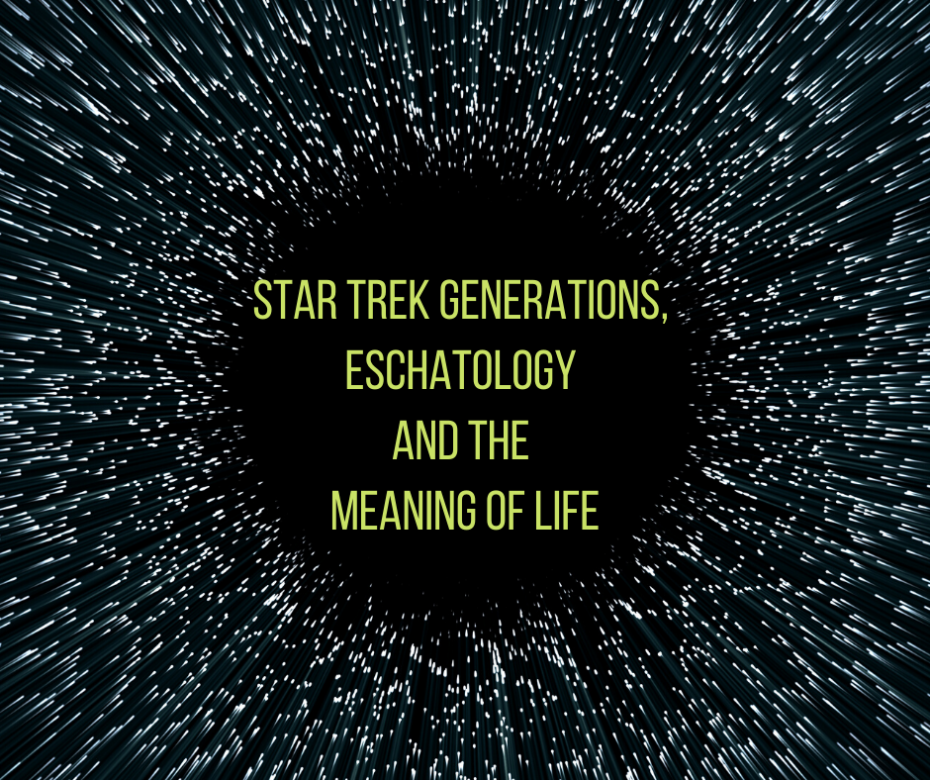I recently re-watched Star Trek Generations, the movie that had both Captain Kirk and Captain Picard. I had not seen it since it came out in 1994. It turns out the film is a debate about the meaning of life after death. It’s about eschatology.
The plot of Generations centers around an extra-dimensional reality called the Nexus.
The Nexus is a kind of heaven. As Guinan, Enterprise-D’s bartender (played by Whoopi Goldberg) described: “It was like being inside joy. As if joy was something tangible…and you could wrap yourself in it like a blanket. And never in my entire life have I been as content.”
Here’s the plot in a nutshell: a mad scientist named Dr. Tolian Soran, whose family was brutally murdered by the Borg, briefly experienced life in the Nexus, but got sucked out. Now he will stop at nothing to get back in. And it doesn’t matter to him how many people he has to kill, or planets he must destroy, to get there. Soran’s philosophy is nihilism: “If there is one constant in this whole universe…it’s death…Afterwards I began to realize it didn’t really matter. We’re all going to die sometime. It’s just a question of how and when.” So Soran has no qualms with mass murder. Nothing matters anyway.
(Note: the Nexus is amoral—even extremely evil people like Dr. Soran can experience bliss there. In fact, you may have to commit mass-murder to get in—it’s salvation by sin!).
During the movie, both Kirk and Picard get sucked into the Nexus, but must leave it to defeat Soran. So the big question is, will they want to? Earlier in the movie, Guinan had warned Picard, “If you go, you’re not going to care about anything. Not this ship, Soran, nothing. All you’ll want is to stay in the Nexus. And you’re not going to want to come back.” Will Kirk and Picard have the strength to choose to leave “heaven” to prevent some suffering on “earth”?
As it turns out, the choice is barely an inconvenience for Picard. He quickly realizes that his idyllic life in the Nexus is fake: “This isn’t right…This can’t be real.” He realizes the Nexus is like living in a holodeck for eternity, so it’s easy for him to choose to leave.
Picard finds out that Kirk is also in the Nexus. He finds Kirk chopping wood in Idaho. At first, Kirk doesn’t want to leave, but it only takes a few minutes of convincing to change his mind. “I know how real this must seem to you,” Picard explains, “but it’s not. This isn’t really your house. We’re both of us caught up in some kind of temporal Nexus.” After Kirk becomes convinced that the Nexus is an illusion, he concludes nothing in it matters. “She isn’t real either, is she? Nothing here is. …Nothing here matters.” During his conversation with Picard, Kirk reveals what he thinks gives life meaning: “Don’t let them do anything that takes you off the bridge of that ship, because while you’re there, you can make a difference.” For Kirk, making a difference is what gives meaning to life. So Kirk decides to leave the Nexus, too (mind you, this came out five years before the Matrix.)
So here are the philosophical and theological questions that the writers of Generations were struggling with—
Dr. Soran struggled with nihilism. He thinks that life doesn’t matter because death negates all meaning. For him, it’s better to live in a happy illusion than to suffer in meaningless reality.
Kirk and Picard also struggled with nihilism. But they prefer living in reality to living in an illusion. And they try to find some meaning in their lives by taking actions that “matter”—at least in the short term.
Who has it right?
In some ways, I’m sympathetic to Dr. Soran. I agree that in a godless universe, nothing you do really matters in the long run because death robs life of absolute meaning. Kirk and Picard can attempt to find some temporary meaning in making small differences—but in the end, all of Kirk’s and Picard’s grand adventures get forgotten (at the start of the movie, Kirk is famous, but becoming a memory).
However, against Soran, I agree with Kirk and Picard that it’s better to live in reality than to live in an illusion.
So what’s the right answer?
It seems to me that the writers of Star Trek Generations were expressing a longing for something their worldview just can’t provide. It’s as if they know what the right answer is—what they want is a life after death that is blissful, but which is real, and where your actions have eternal significance. But they can’t get to that conclusion given a godless universe. So they settle for something less.
But they shouldn’t settle.
As C. S. Lewis once argued:
“The Christian says, ‘Creatures are not born with desires unless satisfaction for those desires exists. A baby feels hunger: well, there is such a thing as food. A duckling wants to swim: well, there is such a thing as water. Men feel sexual desire: well, there is such a thing as sex. If I find in myself a desire which no experience in this world can satisfy, the most probable explanation is that I was made for another world.”
So what were you made for?
Jesus offered everlasting and abundant life (John 3:16; 10:10), that will be lived in a resurrected body, on a renewed, paradisiacal earth (John 11:25-26; cf. Luke 23:43; Rev 2:7; 21:1), where believers will take real actions that make eternal differences (Matt 19:28-29; Luke 19:11-27; Rev 3:21).
You weren’t made for the Nexus or for a world that ends in a meaningless death. You were made for everlasting life with Jesus.


